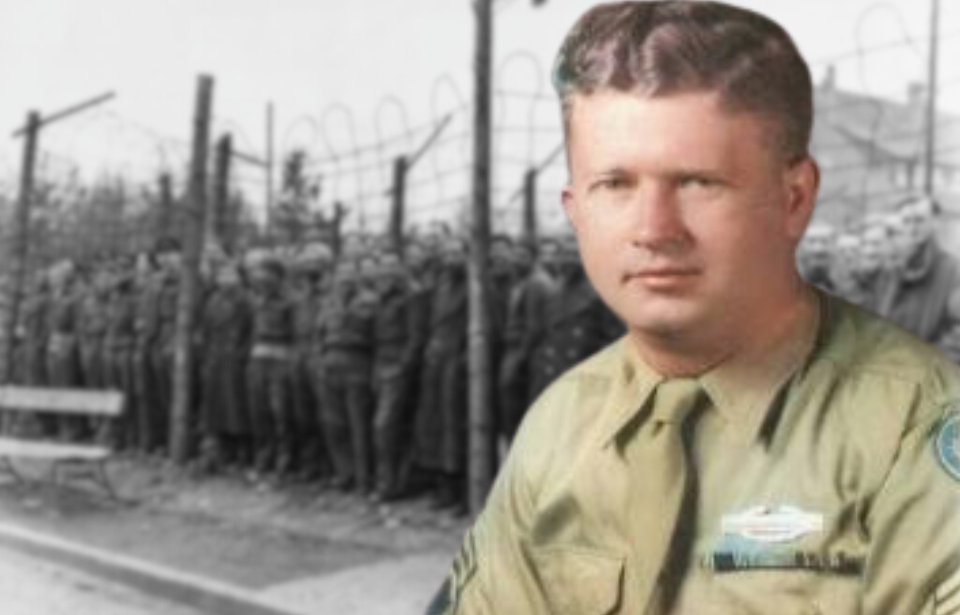Throughout World War II, numerous Americans put their lives on the line to protect those in peril. One of these courageous individuals was Master Sgt. Roddie Edmonds, whose bravery in the face of adversity was exceptional. Even as a prisoner in a German POW camp, this noncommissioned officer boldly disregarded a German commandant’s orders, ultimately saving the lives of hundreds of Jewish-American soldiers.
Roddie Edmonds’ early life and enlistment in the US Army
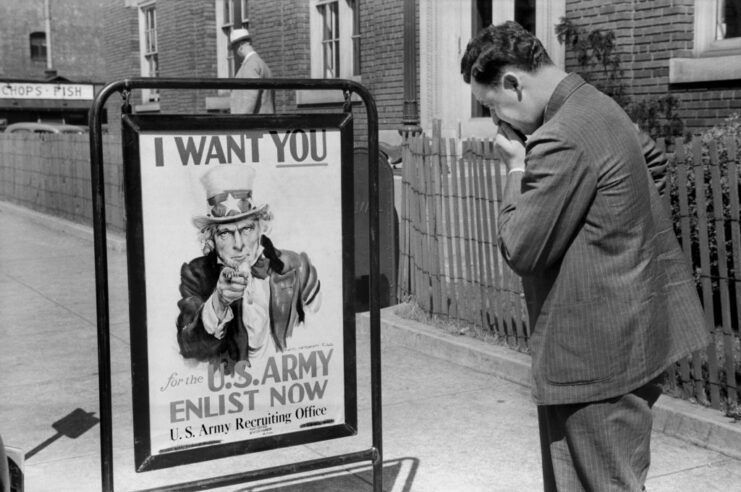
Roddie Edmonds was born on August 20, 1919, in South Knoxville, Tennessee. While not much is known about his childhood, it is noted that he grew up with three brothers, graduated from Knoxville High in 1938, and attended a local Methodist church.
Edmonds enlisted in the US Army nearly nine months before the Japanese attack on Pearl Harbor in December 1941. At 22 years old, he signed up at Fort Oglethorpe, Georgia.
Deployed to Europe
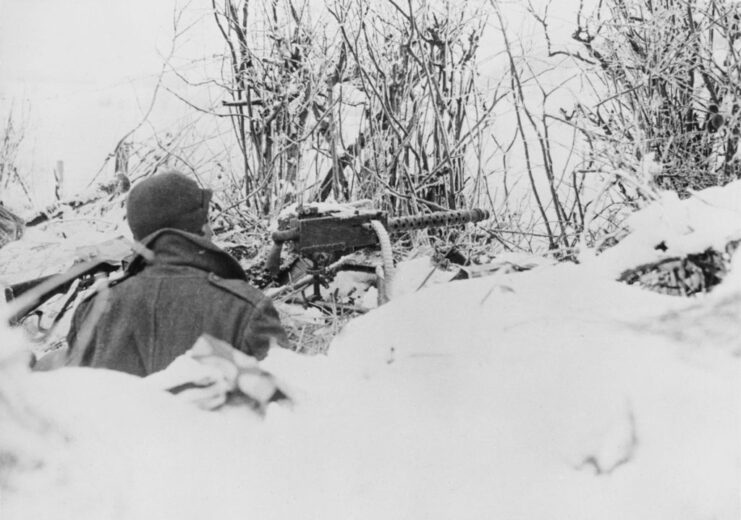
As the Second World War raged across Europe and the Pacific, Roddie Edmonds was sent to Europe with the 422nd Infantry Regiment, part of the 106th Infantry Division. Although he held the position of the highest-ranking noncommissioned officer (NCO) in his regiment, he never flaunted his rank.
“He did not throw his rank around,” fellow veteran Lester J. Tanner shared with Yad Vashem. “You knew he knew his stuff, and he got across to you without being arrogant or inconsiderate. I admired him for his command… We were in combat on the front lines for only a short period, but it was clear that Roddie Edmonds was a man of great courage who led his men with the same capacity we had come to know in the States.”
In December 1944, just five days before the Germans launched the Battle of the Bulge, Edmonds arrived in the European Theater. He fought bravely alongside his fellow soldiers in the 106th, but soon found himself surrounded by enemy forces.
Becoming a prisoner of war (POW)
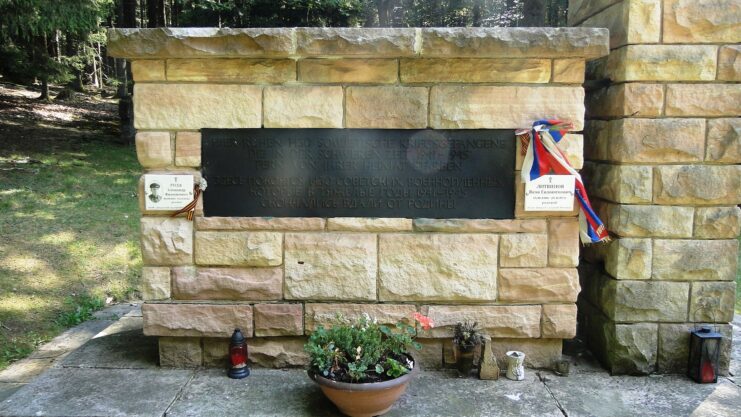
With no viable means of escape, most of Roddie Edmonds’s troops were forced to surrender to the Germans. Edmonds, however, held out for several days before ultimately conceding to the enemy on December 21, 1944.
After his capture, Edmonds and his fellow soldiers were sent to Stalag IX-B, a German prisoner of war camp located near Bad Orb in Hesse. The experience was grueling, with a 50 km forced march to Gerolstein, Germany, followed by a seven-day train ride in cramped boxcars with scant provisions of food and water.
Upon their arrival at Stalag IX-B, the prisoners were sorted into three categories: enlisted men, officers, and noncommissioned officers. As a noncommissioned officer, Edmonds was later relocated to another camp, Stalag IX-A, near Ziegenhain, Germany.
Roddie Edmonds stood up for his Jewish comrades
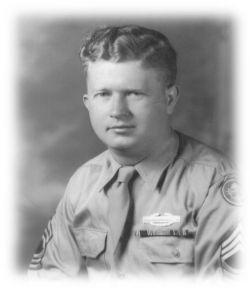
Roddie Edmonds assumed the role of senior-ranking noncommissioned officer at Stalag IX-A, overseeing the camp’s 1,275 American prisoners of war.
On January 27, 1945, the camp commandant ordered Edmonds to present only the Jewish-American soldiers for roll call the next day, with the intent of segregating them from the rest. Sensing the threat this posed to his Jewish comrades, Edmonds defied the order and instructed all the POWs to gather outside their barracks.
Enraged, the commandant drew a pistol and demanded Edmonds identify the Jewish soldiers, threatening to kill him. Unfazed, Edmonds calmly responded, “We are all Jews,” and reminded the German officer that he would be held accountable for war crimes under the Geneva Convention if any harm befell the men, stating they were only obligated to provide their name, serial number, and rank—not their religion.
Recognizing he had been outwitted, the commandant lowered his weapon. Edmonds’ courageous stand is credited with saving the lives of between 200 and 300 Jewish soldiers.
Surviving the war
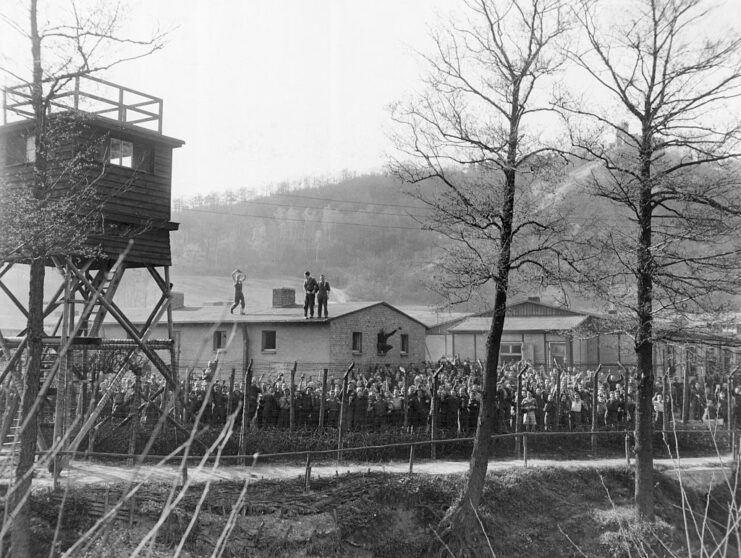
After enduring 100 days as a German prisoner, Roddie Edmonds returned to the United States and chose to keep his experiences at Stalag IX-B private, never speaking of them even to his family.
He later answered the call of duty once more, serving with the US Army during the Korean War. Following his military service, he worked in mobile home and cable sales and held a position at The Knoxville Journal, a local newspaper. Over his lifetime, Edmonds was married three times and passed away on August 8, 1985. He was laid to rest at Berry Highland Memorial Cemetery in Knoxville, never revealing his wartime heroism to anyone.
Edmonds’ brave actions may have remained hidden if not for his son, Rev. Chris Edmonds, who was dedicated to ensuring his father received the recognition he deserved.
Roddie Edmonds was honored by Yad Vashem

After being given his father’s wartime diaries, Roddie Edmonds’ son came across entries about his time at Stalag IX-A. Wanting to learn more, Chris did some digging and located several of the veterans who’d served alongside the elder Edmonds. This ultimately led to the involvement of Yad Vashem, to whom the retired servicemen were willing to share aspects of the master sergeant’s bravery.
Edmonds was recognized as being “Righteous Among the Nations,” Israel’s highest honor for non-Jewish individuals who went out of their way to save people during the Holocaust, in February 2015. Just under a year later, on January 27, 2016, a ceremony was held at the Israeli Embassy in Washington, DC. Then-US President Barack Obama was present.
Of the 25,000 individuals who’ve been named Righteous Among the Nations, Edmonds is only the fifth American. As well, he is the only one to have been an active US service member during the Second World War.
Push to award Roddie Edmonds the Congressional Gold Medal

While happy his father was honored by Yad Vashem, Chris is pushing for more recognition from the United States. He’d initially sought for Roddie Edmonds to be awarded the Medal of Honor, but this was denied, as his actions didn’t occur in combat.
More from us: Witold Pilecki Risked His Life for the Polish Resistance By Voluntarily Being Imprisoned At Auschwitz
New! Want to become a trivia master? Sign up for our War History Fact of the Day newsletter!
There has since been a push to posthumously award Edmonds with the Congressional Gold Medal, the highest civilian award handed out by the US Congress. This has had the backing of many, with the Master Sergeant Roddie Edmonds Congressional Gold Medal Act being introduced in the House on April 24, 2023.
There has been no notable action since this date.
